|
|
|
Sort Order |
|
|
|
Items / Page
|
|
|
|
|
|
|
| Srl | Item |
| 1 |
ID:
149913


|
|
|
|
|
| Summary/Abstract |
National-level policies to promote deployment of low-carbon technologies have been suggested and used as a means to reduce greenhouse gas emissions in the context of international climate change mitigation. The long-term benefits of such policies in the context of international climate change mitigation depend on their effects on near-term emissions abatement and resultant long-term technological change that will reduce abatement costs of achieving global mitigation goals. There is also an argument that these policies might foster early-mover advantages in international low-carbon technology markets. We first review the factors that could influence such benefits and use a global integrated assessment model to present an illustrative example to understand the potential magnitude of these benefits. We find that reductions in long-term abatement costs might not provide sufficient incentives to justify policies to promote the deployment of low-carbon technologies, in particular, the emerging, higher-risk, and currently expensive alternatives. We also find that early-mover advantages can potentially provide substantial benefits, but only if these advantages are both strong and persistent. Our results suggest a role for international cooperation in low-carbon technology deployment to address the existence of free-riding opportunities in the context of global climate change mitigation.
|
|
|
|
|
|
|
|
|
|
|
|
|
|
|
|
| 2 |
ID:
143412


|
|
|
|
|
| Summary/Abstract |
Knowledge spillover from the agglomeration of exporters can reduce the initial costs of exporting faced by other firms and thereby facilitate exports. We use a large dataset of Chinese manufacturing firms to assess whether industrial agglomeration lowers the minimum productivity level required for exporting and whether it increases a firm's probability of exporting. Semi-parametric quantile regressions reveal that the productivity advantage of exporters against non-exporters is markedly smaller in agglomerated regions. Furthermore, a parametric estimation of an export entry model indicates that the agglomeration of incumbent exporters contributes significantly to export participation, although its magnitude is limited. These spillover effects are generated not only by the agglomeration of exporting foreign invested firms (FIFs), but also, more importantly, by that of indigenous Chinese exporters. In fact, the agglomeration of exporting FIFs only contributes to the export entry of FIFs.
|
|
|
|
|
|
|
|
|
|
|
|
|
|
|
|
| 3 |
ID:
117003


|
|
|
|
|
| Publication |
2012.
|
| Summary/Abstract |
In this paper, we discuss what might be termed an action-based learning approach to promoting important pro-environmental actions, such as support for or acceptance of environmental policy. Such an approach involves promoting simple and easy behaviours as entry points for more radical steps towards sustainability, referred to as "catalytic" or "wedge" behaviours. Despite the obvious need for innovative approaches to promote important pro-environmental behaviour, and sound theoretical backing for such concepts, there is a lack of research testing the key propositions of this approach. In a survey study based on a random sample of residents of the state of Maine, USA, we find that both everyday "green" behaviour and the acceptance of an expansion of wind power are rooted in environmental concern and that everyday "green" behaviour gives a significant contribution to predicting acceptance of wind power when controlling for environmental concern. Hence, the promotion of everyday "green" behaviours may prepare the grounds for increasing acceptance of more far-reaching changes in the population, such as an expansion of wind power.
|
|
|
|
|
|
|
|
|
|
|
|
|
|
|
|
| 4 |
ID:
124554
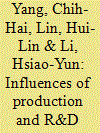

|
|
|
|
|
| Publication |
2013.
|
| Summary/Abstract |
As China adopts a government-supported agglomeration model to develop high-tech industries, it is crucial to examine whether the spatial concentration of manufacturing and R&D activities enhance firm-level productivity. Based on a panel dataset of Chinese electronics firms from 2005 to 2007, the calculated Ellison-Glaeser (EG) index indicates that both production and R&D activities are highly spatially concentrated. Crucially, we find that production agglomeration has a positive relationship with firms' productivity, especially for smaller firms. In contrast, R&D agglomeration seems to negatively relate with productivity. It implies that the possible congestion effect and/or free rider problems erode the benefit derived from knowledge spillovers.
|
|
|
|
|
|
|
|
|
|
|
|
|
|
|
|
| 5 |
ID:
085190
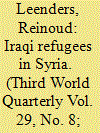

|
|
|
|
|
| Publication |
2008.
|
| Summary/Abstract |
This article explores the implications of the Iraqi refugee crisis for Syria, which is believed to host up to 1.5 million Iraqi refugees. Many policy makers, activists and analysts, sometimes inspired by the conflict repercussions of refugee crises witnessed elsewhere, have warned against the regional security impact of the Iraqi exodus and consequently speculated about a possible spillover of the armed conflicts in Iraq to its neighbours. The article presents an analysis of the characteristics and composition of the Iraqi refugee population and provides an assessment of responses to the refugee crisis in Syria. Its main finding is that fears for a spillover of Iraq's violence cannot be corroborated. The relative absence of refugee violence can be explained in reference to Iraqi refugees themselves. Given their specific demographic and social traits (including age composition, educational levels and professions, and to some extent religious affiliation), in addition to refugees' sectarian segregation, an overwhelming majority of Iraqi refugees are and remain victims of the violence in Iraq; they are unlikely to become its perpetrators abroad.
|
|
|
|
|
|
|
|
|
|
|
|
|
|
|
|
| 6 |
ID:
159018
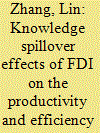

|
|
|
|
|
| Summary/Abstract |
As China is moving toward an innovation-driven economy, this paper offers new insights for both policymakers and investors to optimize the effectiveness of investment performance. This paper studies China's provincial research activities with a focus on the spillover-induced productivity and efficiency change. The results show that spillovers as a result of inflow of foreign investment contribute positively to the performance of overall research activities, however, the productivity effects vary across regions. Our analysis also indicates that highly skewed distribution of FDI leads to a less improved innovation efficiency in FDI-rich provinces. Future innovation policy should adjust the investment profiles based on the preferential innovation output on one hand, and optimize the complementary policy for FDI on the other hand to reduce inefficiency and the potential negative effects of knowledge spillovers. Inter-provincial governmental cooperation is necessary to resolve the uneven distribution of FDI and improve the innovation efficiency in both FDI-poor and rich regions.
|
|
|
|
|
|
|
|
|
|
|
|
|
|
|
|
| 7 |
ID:
143340


|
|
|
|
|
| Summary/Abstract |
That the Lisbon Treaty lays the foundation for a supranational asylum and immigration policy is surprising, even more so for Liberal Intergovernmentalism (LI), whose founder Andrew Moravcsik predicts that no such development will take place. While the article uses LI as its point of departure, it shows that it runs into problems with regards to the policy area of asylum and immigration. The article therefore turns to the (neo-)functionalist concept of spillover. While working with the concept, it was deemed necessary to create a more coherent typology of different spillovers. The article suggests that the concept of spillover may be both descriptive and explanatory. With regards to descriptive spillover, it seems valuable to differentiate between widening and deepening spillovers, but concerning explanatory spillovers, more options became visible: there are unintended or intended functional spillovers, as well as unintended political, cultivated and social spillovers. The argument is illustrated through a detailed study of Sweden – a ‘reluctant European’ that within the area of asylum and immigration made a fundamental U-turn with regards to a supranationalism, a change that can be described as a social spillover.
|
|
|
|
|
|
|
|
|
|
|
|
|
|
|
|
| 8 |
ID:
182545


|
|
|
|
|
| Summary/Abstract |
Spillover effects describe the process of a company benefiting from the R&D activities of another one and thereby gaining an economic advantage. One prominent approach for measuring spillover effects is based on the analysis of patent citation networks. Taking social media analytics and knowledge economics into account, this paper presents a complementary approach to quantify spillover effects from defense to civilian research and development, analyzing 513 employment biographies from the social network LinkedIn. Using descriptive network analysis, we investigate the emigration of personnel of the German defense industry to other civilian producers. Thereby, our study reveals that in the last decade, employees of defense suppliers have changed positions significantly less often, with 3.24 changes on average than professionals who have worked more than 50% of their jobs in the civilian sector, having changed 4.61 times on average. Our work illustrates the churn behavior and how spillover effects between defense and civilian sectors can be measured using social career networks such as LinkedIn.
|
|
|
|
|
|
|
|
|
|
|
|
|
|
|
|
| 9 |
ID:
120622
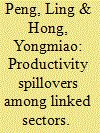

|
|
|
|
|
| Publication |
2013.
|
| Summary/Abstract |
This paper estimates the impact of inter-sectoral linkages on productivity at the sectoral level. An exhaustive Chinese panel data set for capital, infrastructure and a sectoral agglomeration index is linked with an economic distance matrix derived from inter-sectoral transactions. The latter matrix can replace the conventional geographic distance matrix from spatial econometrics. The impact through spillovers is mixed-the direct impact passing to related sectors and back to the initial sector itself, and the indirect impact arising from changes in all sectors. The results suggest that (1) economic growth in a sector is driven by spillovers among sectors that are linked through flows of goods and services; economic distance plays a more important role in stimulating productivity spillover than spatial distance; a shorter economic distance transmits a larger productivity spillover between sectors; (2) infrastructure spillover improves labor productivity in linked sectors; (3) agglomeration diseconomies can be partially reduced by infrastructure investment.
|
|
|
|
|
|
|
|
|
|
|
|
|
|
|
|
| 10 |
ID:
095044
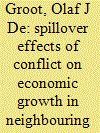

|
|
|
|
|
| Publication |
2010.
|
| Summary/Abstract |
In this article, the influence of conflict on the economies of neighbouring countries is discussed. The results from previous papers show a strong negative effect for an entire area around a country suffering from conflict, but this paper reaches a different conclusion, by using more recent data and adjusting the methodology previously employed. Additionally, a new type of contiguity matrix is constructed and used in the actual analysis. The final analysis consists of a large number of regressions and concludes that conflict actually has two opposing effects. First, like conflict countries themselves, directly contiguous countries actually suffer from the negative effects of proximate conflict. Secondly, however, there is also a positive spillover of conflict, which affects non-contiguous countries and this effect is larger for countries that are closer to the conflict country. The results from the paper predominantly hold for the most violent kind of conflict.
|
|
|
|
|
|
|
|
|
|
|
|
|
|
|
|
| 11 |
ID:
104892


|
|
|
|
|
| Publication |
2011.
|
| Summary/Abstract |
This paper reviews the characteristics of technology learning and discusses its application in energy system modelling in a global-local perspective. Its influence on the national energy system, exemplified by Norway, is investigated using a global and national Markal model. The dynamic nature of the learning system boundary and coupling between the national energy system and the global development and manufacturing system is elaborated. Some criteria important for modelling of spillover1 are suggested. Particularly, to ensure balance in global energy demand and supply and accurately reflect alternative global pathways spillover for all technologies as well as energy carrier cost/prices should be estimated under the same global scenario. The technology composition, CO2 emissions and system cost in Norway up to 2050 exhibit sensitivity to spillover. Moreover, spillover may reduce both CO2 emissions and total system cost. National energy system analysis of low carbon society should therefore consider technology development paths in global policy scenarios. Without the spillover from international deployment a domestic technology relies only on endogenous national learning. However, with high but realistic learning rates offshore floating wind may become cost-efficient even if initially deployed only in Norwegian niche markets.
|
|
|
|
|
|
|
|
|
|
|
|
|
|
|
|
| 12 |
ID:
180159


|
|
|
|
|
| Summary/Abstract |
Energy retrofitting of private housing is fundamental to reducing the environmental footprint of the building stock, and energy efficiency policies are based on assumptions of the effects of retrofitting, including those on further retrofitting, also called temporal spillover. No study has directly investigated the impact of energy retrofitting on future energy retrofits.
|
|
|
|
|
|
|
|
|
|
|
|
|
|
|
|
|
|
|
|
|